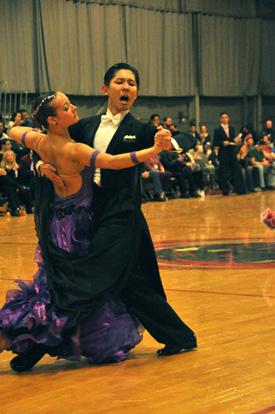
As a freshman, Alec Zhang had never tried — or had any interest in — ballroom dancing. But at the persistence of a high school friend, he decided to take the plunge, knowing if he didn’t like the atmosphere, he could always move onto something else.
Three years later, Zhang hopes to be a professional ballroom dancer.
“It’s kind of difficult to think about that because I’m a student with a major,” Zhang, an information systems and accounting, said. “I could enter the work force normally and this could just be a side thing, but I love it so much that this is what I want to do. I want to make a name for myself and go as far as I can — who knows what that is.”
Right now, he and partner Emily Barnes, who graduated in the spring, are among the top competitors in the Championship division, the highest level of amateur ballroom dancing in the United States. This past spring, the pair won the Pre-Championship division — one below Championship — at the USA Dance Manhattan Amateur Classic and placed in the top 28 at USA Dance Nationals at the Championship level.
They took second place Saturday in Kollaboration DC, an Asian American talent competition held at the University of the District of Columbia.
Zhang and Barnes typically compete in International-style Standard competitions, which feature five styles of dance: foxtrot, quickstep, Viennese waltz and Zhang’s two favorites, waltz and tango.
Though the duo has only been working together for about a year, Barnes said they’re similar in their work ethic and behavior.
“I feel like we’re both pretty mature in how we handle each other,” she said. “Of course we argue some, but we’re usually pretty civil. We give each other feedback, like ‘You’re doing this wrong,’ ‘Well, you’re doing this wrong,’ so we kind of learn from each other.”
The two practice at least three hours a day, six days a week to maintain the high level of their dancing. Zhang said dedication and perseverance are both necessary for rising through the ranks of ballroom dancing — two traits his coaches said have served him well.
“He’s very self-motivated and understands how practice makes perfect,” said coach Slava Sergiev. “It’s difficult to come over to the studio and practice on your own. You get very sweaty, and that’s not easy for a guy, especially when it’s a partnership dance.”
“They have everything,” coach Garry Gekhman added. “Good work ethic, good looks, good character. They have it all.”
For Kollaboration, Zhang and Barnes were dancing without a coach and had total control over the steps and mood of their dance. They chose a waltz-tango combination that highlighted their strengths, but also told a story.
“It’s based loosely around the story of a guy who has lost his sense for this girl,” Zhang said. “The song’s lyrics begin with division or awakening dreams so he’s dreaming about this girl again. That’s what the waltz is based off of — very mystical and slow, with blue lights and a melancholy feeling to it. Then it blackens out and the red light comes on, and that’s when a different form comes, a reincarnation of a vicious form, and no longer this mysterious thing.”
Part of the reason Zhang decided to compete in Kollaboration was to draw visibility to this university’s Ballroom at Maryland team, which he believes could have a much greater presence on this campus.
“Every semester, we have half the girls who end up not being able to find partners and they quit because they can’t compete,” he said. “It’d be nice if we could attract more guys to this, let them know that there’s nothing wrong with doing this. It’s actually a great way to stay in shape and meet people you can bond with.”
diversions@umdbk.com



